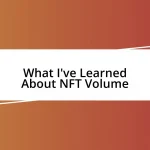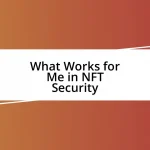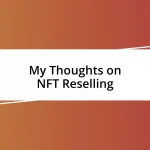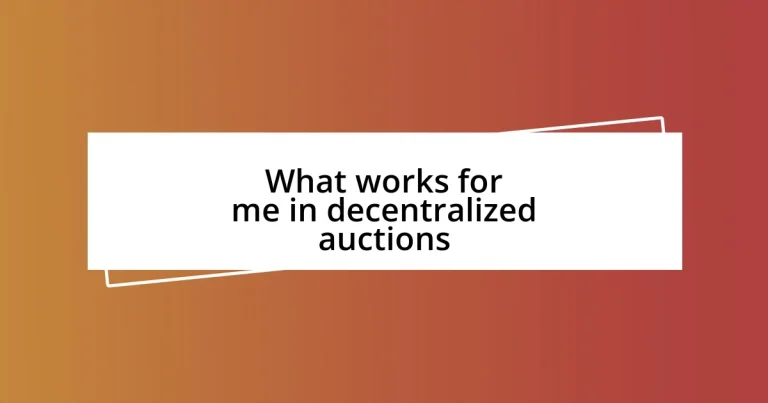Key takeaways:
- Decentralized auctions enhance trust and transparency through blockchain technology, allowing direct participant engagement and community accountability.
- Key benefits include reduced fees, global reach, and the use of smart contracts, which provide stability and eliminate uncertainty in transactions.
- Future trends in decentralized auctions may involve specialized niche platforms and gamification elements, transforming bidding into dynamic, community-oriented experiences.
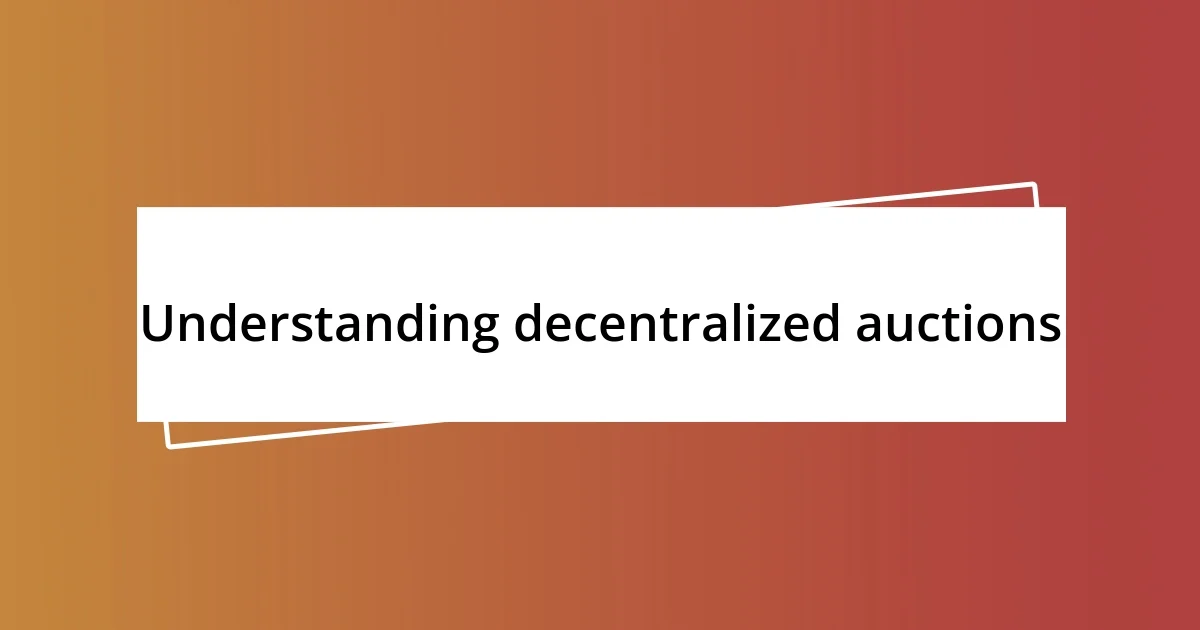
Understanding decentralized auctions
Decentralized auctions are fascinating because they operate without a central authority, allowing participants to engage directly with one another. I remember my first experience with a decentralized auction platform; the thrill of placing bids in real-time, knowing my bid was a direct reflection of my intentions, was invigorating. It felt more like a community rather than a transaction, and that personal connection can enhance the bidding experience.
In this model, blockchain technology ensures transparency and security, which is a game-changer for trust in the auction process. Have you ever doubted the legitimacy of an online auction? I certainly have, but with decentralization, that worry evaporates. You can see every transaction and bid on the blockchain, which gives me a sense of empowerment and confidence that I never felt in traditional auctions.
Feedback and peer reviews in decentralized auctions create a sense of accountability that I’m particularly fond of. It’s like being part of a club where everyone’s reputation is on the line. Each member’s track record can deeply influence the bidding dynamics, which fascinates me. What do you think happens when trust becomes a common currency among bidders? I find that it shapes the entire auction atmosphere, turning it into a collaborative endeavor rather than a cutthroat competition.

Benefits of decentralized auctions
The benefits of decentralized auctions are undeniable and can completely transform the bidding landscape. One fascinating advantage is the removal of middlemen, which not only reduces fees but also accelerates the entire process. When I first encountered a decentralized platform, I was amazed by how quickly transactions moved compared to traditional methods. It felt liberating to engage directly, knowing that my choices were shaping the outcome without unnecessary delays.
Moreover, the global reach of decentralized auctions truly appeals to me. I love the idea that I can connect with bidders from different corners of the world, opening up a marketplace teeming with diversity. I recall a memorable auction where I was bidding on a unique art piece, and the excitement of competing with someone halfway across the globe added a layer of intrigue to the experience. It’s like being part of a global community where everyone’s interests converge, and that fosters an environment of innovation and creativity.
Additionally, the stability offered by smart contracts in decentralized auctions is something I deeply appreciate. These contracts ensure that terms are met automatically, eliminating uncertainty and disputes. I remember a previous bidding experience where misunderstandings arose, leading to frustration. With smart contracts, I can focus on the thrill of the auction rather than worrying about potential hiccups. It’s this assurance that truly enhances my enjoyment of the process.
| Benefit | Description |
|---|---|
| Reduced Fees | No middlemen means lower costs for participants. |
| Global Reach | Connect with bidders worldwide, enhancing competition and diversity. |
| Smart Contracts | Automatic enforcement of auction terms, providing stability and trust. |
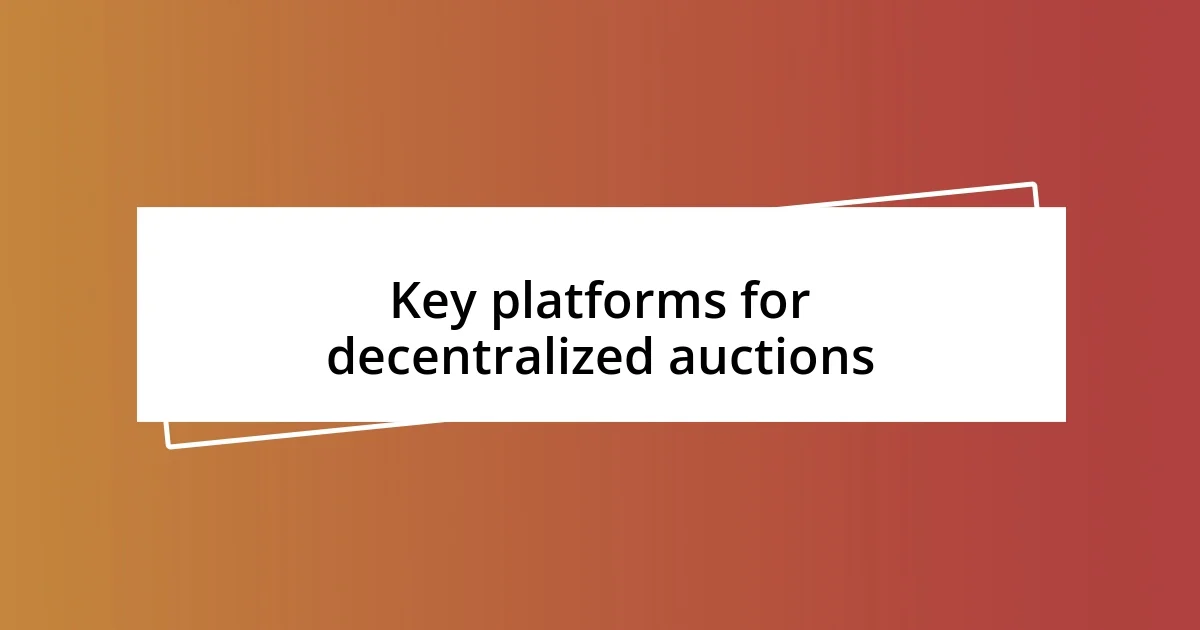
Key platforms for decentralized auctions
Decentralized auction platforms have carved out a unique niche in the digital landscape, each offering distinct features that enhance the bidding experience. From my perspective, the choice of platform can significantly impact how immersive and enjoyable the process feels. I recall a time when I discovered a platform that not only allowed for real-time bidding but also enabled users to share their auction experiences through live chats. Being able to connect with other bidders in real-time made the entire event feel like a vibrant festival rather than just a simple transaction. It’s thrilling to think about the community aspect that many of these platforms foster.
Here are some notable platforms that stand out in the decentralized auction space:
- OpenSea: This platform specializes in NFTs and has become a go-to marketplace for digital art and collectibles. I cherish the excitement of discovering unique pieces created by artists from all over the world.
- Rarible: Known for its community-driven approach, Rarible empowers users to create and auction their own digital items. I get a kick out of watching new talent showcase their work through auctions.
- Zora: This innovative platform allows for dynamically priced auctions, ensuring that bids reflect the true market value. I find the concept of responsive pricing to be incredibly engaging.
- SuperRare: Focused on high-quality digital art, SuperRare combines curation with decentralization. It’s exhilarating to be part of an exclusive art community where each piece has a story behind it.
- Foundation: Foundation is an artist-friendly platform that emphasizes scarcity and collectability. I remember the anticipation I felt placing a bid on a drop, wondering if I would own a piece of history.
Each of these platforms reflects unique characteristics that enhance the decentralized auction experience, reminding me just how exhilarating it is to engage with a community of like-minded individuals.

Strategies for successful bidding
One strategy I’ve found crucial for successful bidding is setting a budget before I enter a bid. It sounds simple, but having a clear maximum limit helps me avoid the emotional rollercoaster that can come with competitive bidding. I remember one auction where I lost track of my spending, and it was disheartening when I realized I had gone over my planned budget. By being disciplined and sticking to my numbers, I can enjoy the experience without regret.
Another effective tactic is to observe bidding patterns and timing. I often take note of when other participants seem to jump in or back off. In one memorable auction for a rare vinyl record, I noticed the bidding slowed down right before the final minutes. Using that knowledge, I waited until just before closing to place my bid, which surprised everyone and ultimately secured me the item at a lower price than I anticipated. Timing, it turns out, can be just as critical as the bid itself.
Lastly, I can’t stress enough the importance of understanding the item I’m bidding on. Doing thorough research not only boosts my confidence but also equips me with insights that can be a game changer in the bidding process. When I first participated in an NFT auction, I immersed myself in market trends and artist backgrounds, which surprisingly allowed me to bid on pieces that had the potential for greater value. It’s fascinating how knowledge can enhance my bidding power and bring a more satisfying sense of ownership once I win a piece I genuinely value.
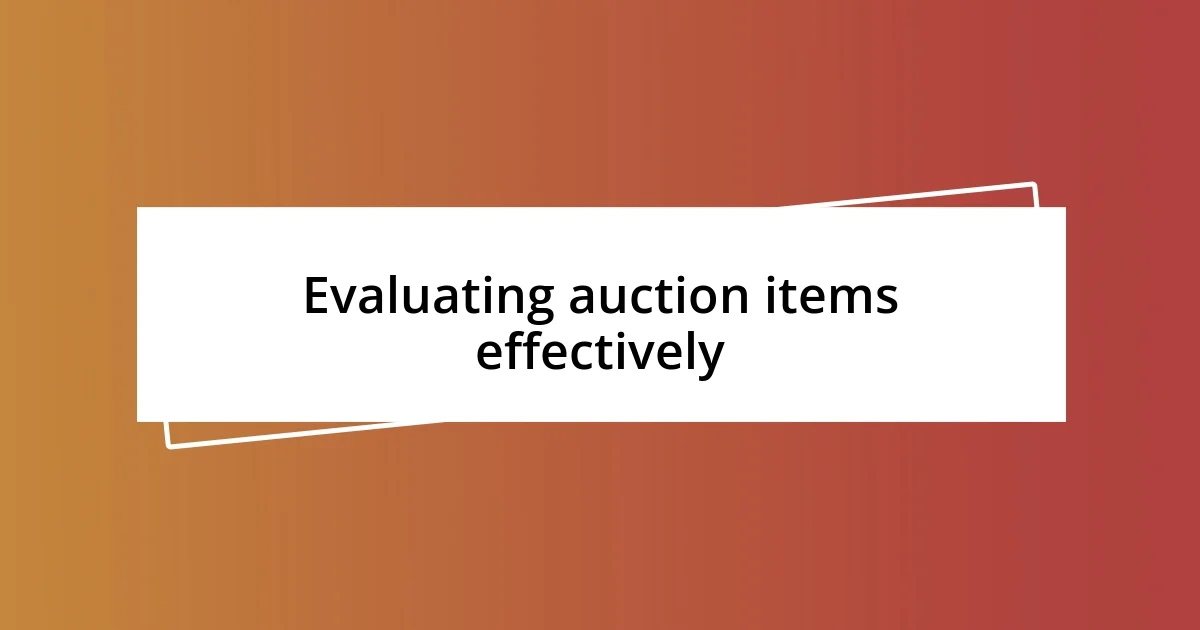
Evaluating auction items effectively
When evaluating auction items, I believe it’s essential to consider the uniqueness of each piece. For instance, I once encountered a digital artwork that spoke to me; its vibrant colors and intricate details drew me in. I can’t help but wonder: What makes a piece truly special to you? Recognizing personal preferences can guide us in identifying items that resonate on an emotional level, ultimately enhancing our bidding experience.
Additionally, assessing an item’s provenance is paramount. I recall participating in an auction for a limited-edition collectible. The seller provided a detailed history of its origin, which not only increased my interest but also my willingness to bid. If you’re contemplating an item with an intriguing backstory, how much more appealing does it become? Understanding where an item comes from can not only add value but also foster a deeper connection to the piece itself.
Lastly, considering the item’s market performance is something I’ve learned to prioritize. I remember seeing an NFT that had skyrocketed in value since its release, catching my attention immediately. This made me pause to think: Is the excitement around this piece sustainable? Analyzing past auction results and current trends can offer crucial insights, allowing me to make informed decisions that make bidding feel less like a gamble and more like a calculated strategy.
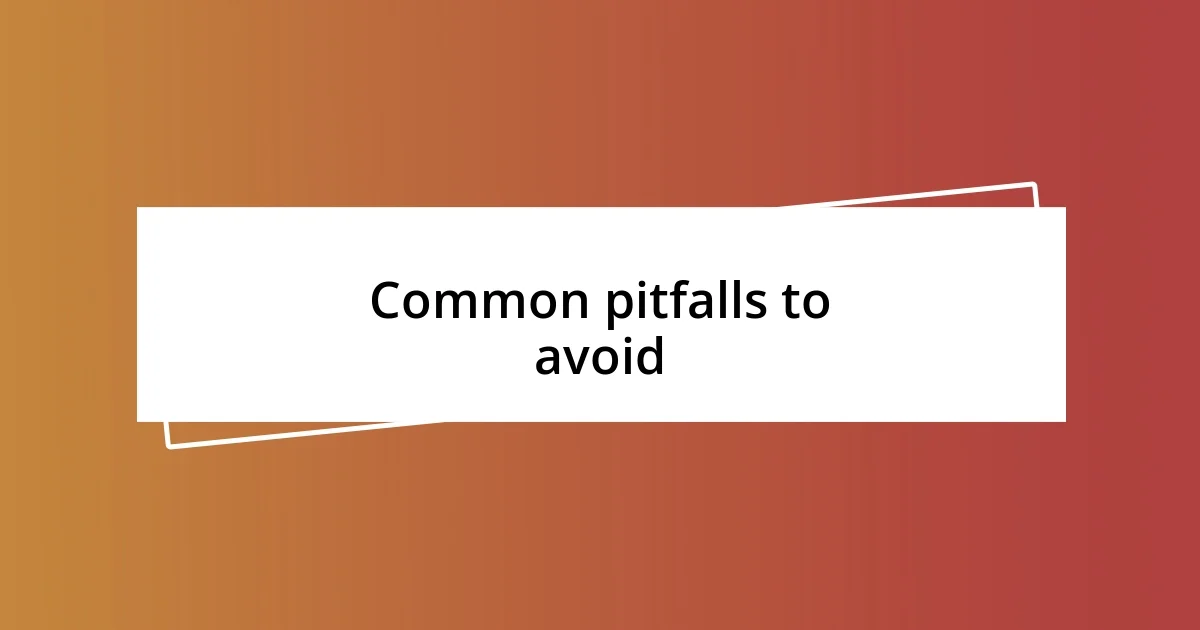
Common pitfalls to avoid
One common pitfall I often see in decentralized auctions is failing to consider the auction’s timeframe. I vividly recall a time I got too caught up in the initial excitement and forgot about the auction’s deadline. Suddenly, the countdown became a frenzy, and I found myself scrambling to place my bid at the last minute. The lesson here? Always be aware of how much time you have left. Planning your entries and anticipating others’ moves can save you from that last-minute panic.
Another misstep I’ve encountered is underestimating the competition. There have been instances where I believed my insights about an item gave me a substantial edge, only to be completely blindsided by a seasoned bidder. Their strategies were so refined that it was a wake-up call for me. It’s essential to recognize that others might have done their homework as well and are just as eager to secure the item. A little humility in acknowledging the competition can guide you to be more strategic in your bidding approach.
Lastly, overlooking the bidding rules specific to the auction platform can be a costly error. I learned this firsthand when I entered a decentralized auction that involved unique conditions I hadn’t fully understood. Without that knowledge, I lost out on an item simply because I didn’t realize I couldn’t retract my bid once placed. Reflecting on this, I now always take the time to read the rules thoroughly. Have you ever been caught off guard by unexpected terms? That experience taught me the importance of preparation, making sure every detail is accounted for before diving in.
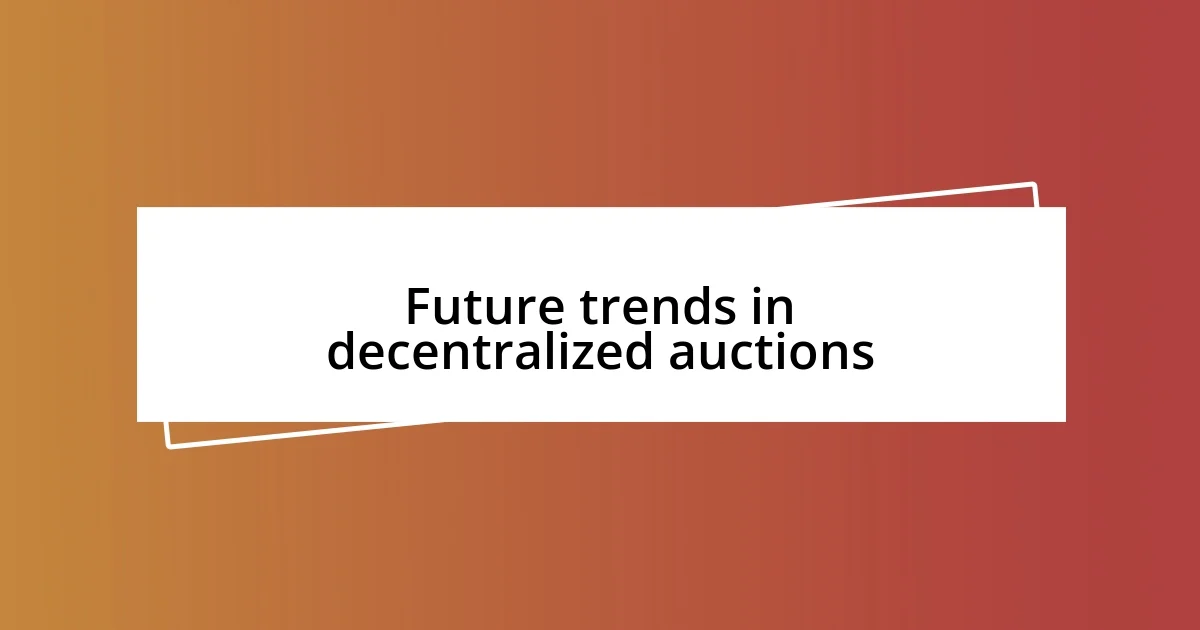
Future trends in decentralized auctions
When I think about the future of decentralized auctions, I can’t help but feel excited about the rise of blockchain technology. Its transparency could reshape how we trust sellers and items. I remember the first time I participated in an auction where bids were recorded on a blockchain; the sense of security felt revolutionary! Imagine a world where every auction transaction is verifiable and secure, giving bidders peace of mind in an often chaotic environment. How much more confident would you feel placing a bid knowing that every detail is preserved immutably?
As new entrants continue to enter this space, I foresee a trend toward more specialized auction platforms. Just last month, I stumbled upon a niche auction site dedicated solely to vintage vinyl records. The community, filled with passionate collectors, created an atmosphere of authenticity and excitement. It made me wonder: is it possible that these smaller, specialized platforms could provide a richer, more engaging bidding experience? With a focus on specific interests, they offer a chance to connect with like-minded individuals in a way the larger, general platforms can’t replicate.
Additionally, I see gamification playing a significant role in future decentralized auctions. Recently, I participated in a platform that blended bidding with challenges and rewards. I found it engaging to earn points for participating or winning, which transformed an ordinary bidding experience into something much more dynamic. Could this be the future of auctions? As we start to see more interactive elements introduced, I believe we might witness a shift that attracts even more participants, making bidding not just an activity but a community-oriented event.
